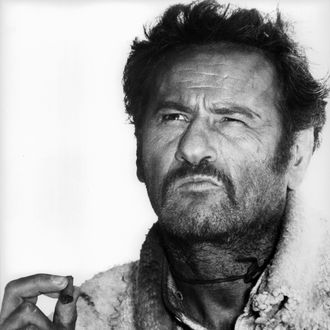
The first time I saw Eli Wallach was in a movie no one liked and few remember. It was called The Deep, a sexy scuba-diving thriller starring Nick Nolte and Jacqueline BissetÔÇÖs T-shirt, and Wallach played an ancient sailor named Coffin. I liked it. I was 6 years old, and the best things about it to my eyes were a giant moray eel and this larger-than-life character. And the riveting actor who played him.
That was a minor entry in the long and diverse career of Wallach, who died Tuesday at 98, but it speaks a little to his greatness. Whether the movie was good or bad, he was the guy you remembered ÔÇö the one who stood out because his performance was so often bigger than everybody elseÔÇÖs. That was his great gift, and maybe to some, his great flaw. Sure, there was often a theatricality to his performances, but it was never staginess. Rather, he conveyed a kind of delight in the ability to be larger than life. His great-nephew, New York Times film critic A.O. Scott, put it rather well in a touching profile of Wallach┬áin 2010: ÔÇ£With Eli, there is an impish, sly quality, not self-conscious winking, exactly, but a relish at the sheer fun of acting.ÔÇØ You loved watching him chew scenery. He made you feel like you were chewing it along with him.
Wallach was often a lead ÔÇö a legend, actually ÔÇö on Broadway, but a supporting actor on film. That maybe speaks to the fact that he didnÔÇÖt have movie-star good looks (though he was apparently everybodyÔÇÖs first choice for the part that won Frank Sinatra an Oscar in From Here to Eternity). But he had a starÔÇÖs ability to transform the movies he was in. He didnÔÇÖt disappear into a part like a typical character actor, but brought things to his level; he never really stopped being Eli Wallach.
Think about it: The Good, the Bad and the Ugly is his movie. It starts and ends on him, and heÔÇÖs the one weÔÇÖre invested in. HeÔÇÖs the one forever zig-zagging between nobility and betrayal, between desperation and cockiness┬áÔÇö his features and his frame dancing between those two monumental stone faces, Clint Eastwood and Lee Van Cleef. Even at their worst, WallachÔÇÖs characters carry you along with them, almost confiding in and charming you. ItÔÇÖs his boisterous, sneering villain in The Magnificent Seven who establishes that filmÔÇÖs baseline of cruelty and vengeance, who sells the filmÔÇÖs sadism. (IÔÇÖd say he steals the show there, but that would be unfair to James Coburn and Yul Brynner.) ÔÇ£I always end up being the evil one, and I wouldnÔÇÖt hurt a fly,ÔÇØ the actor once said.
ItÔÇÖs interesting to see WallachÔÇÖs early performances, both in films like his friend Elia KazanÔÇÖs Baby Doll (his first feature film role) and in TV dramas like Playhouse 90ÔÇÖs The Plot to Kill Stalin. So often he had to play the vengeful rival, the bandit, the sneering functionary. But heÔÇÖs riveting in these parts, and you wonder if maybe heÔÇÖd been a little younger, he might have gotten the big leads when the New American Cinema of the 1970s rolled around, with its carnival of paranoid antiheroes and charming hucksters.
But why wonder about that? In the end, he got the better end of the deal. He got to be Eli Fucking Wallach.


